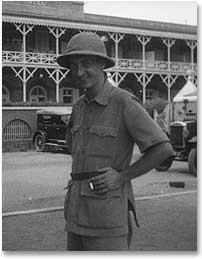|
The 1996 films were not especially outstanding, and The English Patient was actually a legitimate candidate for Best Picture. The other nominees were Shine, Secrets and Lies, Fargo and Jerry Maguire. The top unnominated films were Trainspotting, Sling Blade, Larry Flynt, and Breaking the Waves. I don't feel that English Patient was out of its league in that company. I would not have voted for it, but I can understand that people did so with the certainty of their convictions. For the record, here is how IMDb voters rank the 1996 films as of now (November, 2002). Films highlighted in dark blue were Oscar's best picture nominees.
It seems to me that the film has gone in six years from overrated to underrated.
I did find some elements of the movie rather irritating: |
|||||||||||||||||||||||||||||||||||||||||||||||||||||||||||||||||||||||||
|
1. Neither the author nor the characters in the film
seem to know which side Hungary was on in WW2. There was a real Count
Laszlo de Almasy (right), and he collaborated willingly with Axis
powers in North Africa. The real Almasy, according to Laszlo Pathy,
Hungarian consul general in Alexandria (writing in his journal),
wanted to use a desert museum as a front for Nazi espionage. Its goal:
the occupation of Egypt. And that was back in the mid 1930's. When the
project was scotched in 1936, Almasy blamed Pathy and put his name on
a list of arrests to be made when Nazi Field Marshal Erwin Rommel
occupied the country. Almasy was awarded an Iron Cross by Rommel. Hungary was a fascist dictatorship which was sympathetic to Nazi Germany from the beginning, and was eventually a member of the Axis. The other characters in the story don't seem to realize this, even though it would actually have been very important to them at the time. The real Almasy, for example, tried to work with the British, but was turned down because he was suspected from the start of being a Nazi spy, as just about any Hungarian would have been. Of course, all that doesn't really have much bearing on our evaluation of the movie, which does not pretend to be based closely on the real Almasy, but it is irksome because the entire historical context is completely misleading and misstated. My point is not that the real Almasy was a Nazi sympathizer, but that the characters in the story should have and would have assumed that the fictional one was a German supporter because of his nationality (as people did in reality). No Hungarian would have been trusted by the Allies. He had to be either an enemy or a traitor, and neither of those options would have encouraged the British to bond with him. This has nothing to do with the film, but by the way, the real Almasy was also a homosexual, and his wartime lover was a German officer! Students, would it work as well as a gay love story between fascists? Discuss. Why the need to take a real person from history and change every important detail of his existence? I wonder why the author didn't just make up a fictional name and make the character Dutch or Norwegian, people that actually worked closely with the British. |
|
||||||||||||||||||||||||||||||||||||||||||||||||||||||||||||||||||||||||
|
2. How in the hell did the musicians keep a straight face when they were recording that syrupy score? 3. Why was Willem Dafoe in this movie? Wasn't the story long enough? Was there an earlier draft in which his character served some purpose? (I haven't read the novel.) |
|||||||||||||||||||||||||||||||||||||||||||||||||||||||||||||||||||||||||
|
Tuna's comments in yellow: For all its awards, The English Patient is rated only 6.9 by men at IMDb, and 7.3 by women. In other words, it is a weepy estrogen-centric tragic love story. I have tried several times, and have never stayed awake through the entire 160 minutes of running time. It is beautifully photographed, but that doesn't sustain me for more than two and a half hours. |
|
||||||||||||||||||||||||||||||||||||||||||||||||||||||||||||||||||||||||
|
|||||||||||||||||||||||||||||||||||||||||||||||||||||||||||||||||||||||||

